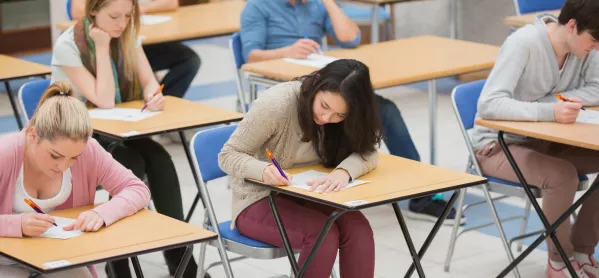The November GCSE exam series could pose a serious public health risk as colleges host large cohorts in high-risk areas, the Association of Colleges has warned.
In a letter to schools minister Nick Gibb, the AoC's chief executive, David Hughes, said he would "welcome urgent discussion about whether going ahead with this series of exams is the right thing to do."
He wrote that many colleges would have large entry numbers this November – often with over 500 students, and some are in high or very high tier areas in the North West, Yorkshire and West Midlands. He added that colleges would apply the social distancing and health measures recommended by Ofqual and the Joint Council for Qualifications to minimise the risks, "but for many it will result in the closure of entire campuses to other students on the exam days to manage numbers safely".
Coronavirus: Should GCSE exams go ahead in November?
"We have serious concerns about the potential public health risks this presents and would welcome urgent discussion about whether going ahead with this series of exams is the right thing to do. The rapid spread of the second wave, and the Sage [scientific advisory group's] advice from 21 September are worrying college leaders who want to make the right balance between safety of students and supporting them to take these exams."
GCSE November resits: The right move at the wrong time?
Sage scientists: 'Teaching in colleges should be all online'
Coronavirus: 'Intense' Covid transmission from 17- and 18-year-olds
Minutes from a Sage meeting three weeks ago revealed that the scientists recommended that colleges and university move all teaching online unless "face-to-face teaching was absolutely essential". The government called on colleges to continue to offer a mix of on-site and online delivery.
Mr Hughes also added that if the November resits did ago ahead, colleges should receive support funding from the government. Currently, colleges are excluded from support funding to host the autumn series of exams.
He said: "If the November resits do go ahead, we would welcome a rapid review of the guidance, particularly for the highest risk areas and I would ask you to extend the support funding available for the autumn series to include post-16 'condition of funding'(resit) candidates."
Mr Hughes added: "There will be even greater logistical challenges in summer 2021 than this November due to the numbers of students involved. We would hope that transport and site management issues will be easier by that stage, but for colleges there will be very large cohorts of candidates in popular exam subjects and in GCSE English and maths which will need special planning. At the very least we would urge you to consider supporting the additional costs for these colleges."
A Department for Education spokesperson said: “The autumn exam series is a crucial part of ensuring fairness for students who would like to sit an examination this year, or were unable to receive a grade because, for example, they are private candidates.
“We have worked with Public Health England to develop and publish guidance for schools and colleges running exams in autumn 2020 to enable staff to run exams and other assessments safely for both students and invigilators. This guidance also sets out that we expect schools and colleges in areas under local restrictions to run exams.
"As with all our published guidance, we continue to work closely with PHE to keep the information under review.”




